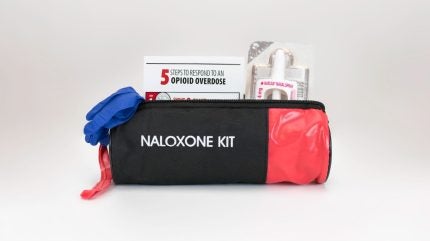
The UK Government is set to revise legislation to allow a wider range of professionals, including paramedics, nurses, police officers, probation workers and homelessness service workers, to supply opioid overdose antidote naxolone without a prescription.
The expansion aims to save lives by enabling quicker responses to opioid overdoses among vulnerable populations.

Discover B2B Marketing That Performs
Combine business intelligence and editorial excellence to reach engaged professionals across 36 leading media platforms.
Naloxone is known for its rapid action in reversing opioid overdose effects, particularly breathing difficulties.
The impending legislative update will permit the distribution of take-home naloxone supplies to individuals who may encounter opiate users at high risk of overdose.
Currently, naloxone can be administered by anyone in an emergency, but legal supply without a prescription is restricted to drug and alcohol treatment services.
The government’s move will facilitate wider access to the life-saving medication, which is effective against overdoses from heroin and synthetic opioids such as fentanyl or nitazenes.

US Tariffs are shifting - will you react or anticipate?
Don’t let policy changes catch you off guard. Stay proactive with real-time data and expert analysis.
By GlobalDataIn conjunction with the changes, the government has unveiled a new ten-year strategic plan focused on enhancing the drug and alcohol treatment and recovery workforce.
It marks the country’s first national workforce plan for this specialised health sector, setting out objectives to expand and upskill staff, including the introduction of better training for presently unregulated roles.
The workforce development plan is part of a broader ten-year drug strategy aimed at curtailing illicit drug use and reducing drug-related deaths.
The strategy includes a commitment to prevent around 1,000 drug-related deaths by the end of next year, aiming to reverse the increasing trend observed since 2015.
Supporting this strategy, the government pledged an additional £532m ($667.2m) from 2022 to 2025 to enhance the capacity and quality of drug and alcohol treatment services.
The investment is expected to facilitate the growth of the treatment workforce by the end of the financial year 2024 to 2025.
UK Health and Social Care Secretary Victoria Atkins stated: “Opioid addiction can ruin lives and is responsible for the largest proportion of drug-related deaths across the UK.
“We are working hard to reduce those numbers by expanding access to naloxone to save the lives of the most vulnerable.
“Our ten-year workforce plan will expand and boost the training of the next generation of drug and alcohol workers to improve services and support people to get their lives back on track.”




